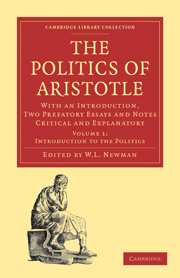Introduction to the Politics, Pages 1-201
Published online by Cambridge University Press: 07 September 2011
Summary
INTRODUCTION
The Politics linked to the Nicomachean Ethics—the transition from the latter treatise to the former examined.
Aristotle's treatment of the science of πολιτική falls, Plato's, into two distinct parts, and extends over two treatises, the Nicomachean Ethics and the Politics. The fact is significant, and we are not surprised to find the two sections show, as we shall see hereafter, a certain tendency to draw away from each other. They stand, however, in the closest mutual relation : the Ethics comes first in order, the Politics second. The Ethics naturally precedes, as it mainly analyses happiness in the individual, and Aristotle's principle is that the study of the part (τò ελáχιστον, τò ἀσúνθετον) should precede the study of the whole. Other reasons for the precedence of the Ethics will be pointed out elsewhere.
The transition from the one treatise to the other, however, is by no means as smooth and easy as we might expect. We are told in the last chapter of the Ethics that it is not enough for the student of Practical Philosophy to know what happiness and virtue and pleasure are without seeking their realization in practice, and that they can hardly be realized in practice without the aid of Law. The State, Aristotle continues, should use Law with a view to their realization, but the Lacedaemonian State is almost the only one which does this systematically, and which exercises a supervision over the rearing and life of its members. The head of the household is almost everywhere left to him pleases.
- Type
- Chapter
- Information
- Politics of AristotleWith an Introduction, Two Prefatory Essays and Notes Critical and Explanatory, pp. 1 - 201Publisher: Cambridge University PressPrint publication year: 2010First published in: 1887
- 1
- Cited by

